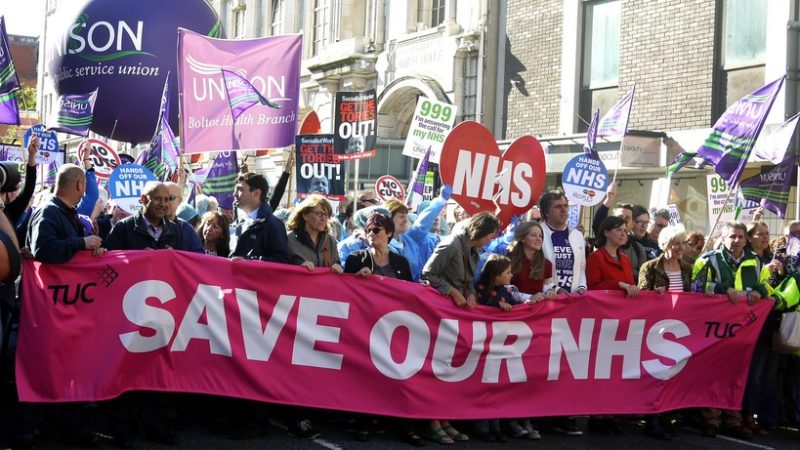In the second piece of our series, Unite health officers Sarah Carpenter and Colenzo Jarrett-Thorpe write about mistrusting Tory plans and a NHS for the many, not in the hands of a few.

With the NHS celebrating its 70th birthday, the debate continues to rage over the future funding and structure of the health service.
This as NHS campaigners fight to contain the octopus-like tentacles of privatisation and fragmentation.
Campaigners have focused on the controversial reorganisation kicked off by the 44 Sustainability and Transformation Plans (STPs) to reconfigure the NHS across England.
Unite, the country’s largest union with 100,000 members in the health service, dubbed STPs as Slash, Trash and Privatise, as health staff feared they were Trojan Horses designed to cut services, break up and, ultimately, privatise NHS services.
The STP programme is driven by financial goals unsupported by concrete evidence, clouded by a lack of transparency and where health professionals are not consulted.
The end result of such a cocktail is that this will lead to large scale cuts and job losses, with the patients being put at risk.
The campaign had partial success. The STP acronym quickly began to metamorphose as the NHS began churning out multiple other acronyms to explain it reforms – ICOs, ACOs, ACSs – describing a myriad of attempts to integrate services and deliver more services with less money.
Unite has never been opposed to the idea of integrating care, but we are concerned that the reforms have no legal basis, which means that the discredited 2012 Health and Social Care Act remains the legislative bedrock for the NHS.
The 2012 Act left a trail of destruction and fragmentation from the multiple agencies and bodies that it set up, so much so that the people that work for these organisations don’t understand how to navigate this rotten system.
While this may appear a technical point, the act reinforces the tendering of NHS contracts, which is an ‘Open Sesame’ for profit-hungry private healthcare companies keen to gobble up lucrative contracts to the detriment of overall service provision.
Unite made its case forcefully in its submission to the Health and Social Care select committee which has investigated STPs.
We are not convinced that the select committee, chaired by Conservative MP Dr Sarah Wollaston, has fully grasped our concerns about STPs. While conceding that STPs got off to ‘a poor start’, the committee in its report calls on national bodies, such as NHS England, Public Health England and the CQC, to develop a national transformation strategy ‘to strengthen the programme infrastructure of STPs’.
We await, with interest, the government’s reaction to the select committee’s report.
The founding premise of the NHS, as framed by its founder Aneurin Bevan in 1948, was relatively simple i.e. that the NHS would be available to all those in need, free at the point of delivery.
Since then, right-wing ideologues have chipped away at the NHS ethos in the misguided belief that the NHS can be run on the same free-market principles as supermarkets or budget airlines – and that what should be for the public good can also be used as a trough for private profit.
This reached its flawed apotheosis with the 2012 Act, the brainchild of then health secretary Andrew Lansley. Lansley was later given a peerage as ‘a reward for failure’.
Yet, still the tide of cuts and privatisation laps against the NHS, and we believe its latest manifestation is in the form of STPs in their many guises.
The NHS’s core problem is lack of funding to keep pace with an ageing population and fast-moving medical innovation. This is not a problem that can be solved by privatisation, but by a substantial and sustained increase in funding.
Theresa May’s recent announcement that the NHS in England is to get an extra £20bn a year by 2023 is the bare minimum required.
Labour has committed to a review of the legislative structures of the NHS, which needs an overhaul to re-enshrine its 1948 principles. However, it will take many years to untangle the mess left by the Tories.
Unite’s recent national health conference voted unanimously ‘to vigorously resist’ the fundamental changes happening because of ‘the acceleration’ of the STP programme.
Unite does not oppose reform of the NHS on principle, but believes that discussions about the future reform of the NHS must be funded, clinical evidence driven and remain true to its founding principles.
Any response to rising costs must be met by society collectively through progressive general taxation rather than transferred to those unfortunate enough to be sick or injured, as happens in many other countries.
Since the Tories came to power in 2010, government policy has been riddled with false economies and ideological decisions that have little basis in scientific evidence or what the public wants and needs.
This has directly contributed to many of the current problems facing the NHS. And social care systems as policy failures have made the service more fragmented, bureaucratic and cumbersome, while stripping away resources and demanding that staff do more for less pay.
The Tories push towards privatisation is, in real terms, a veritable ‘race to the bottom’.
As the NHS, cherished by millions, reaches its 70th anniversary, now is the time to nail the flag to mast and reaffirm its founding values.
Sarah Carpenter and Colenzo Jarrett-Thorpe are Unite national health officers.
To reach hundreds of thousands of new readers we need to grow our donor base substantially.
That's why in 2024, we are seeking to generate 150 additional regular donors to support Left Foot Forward's work.
We still need another 117 people to donate to hit the target. You can help. Donate today.



